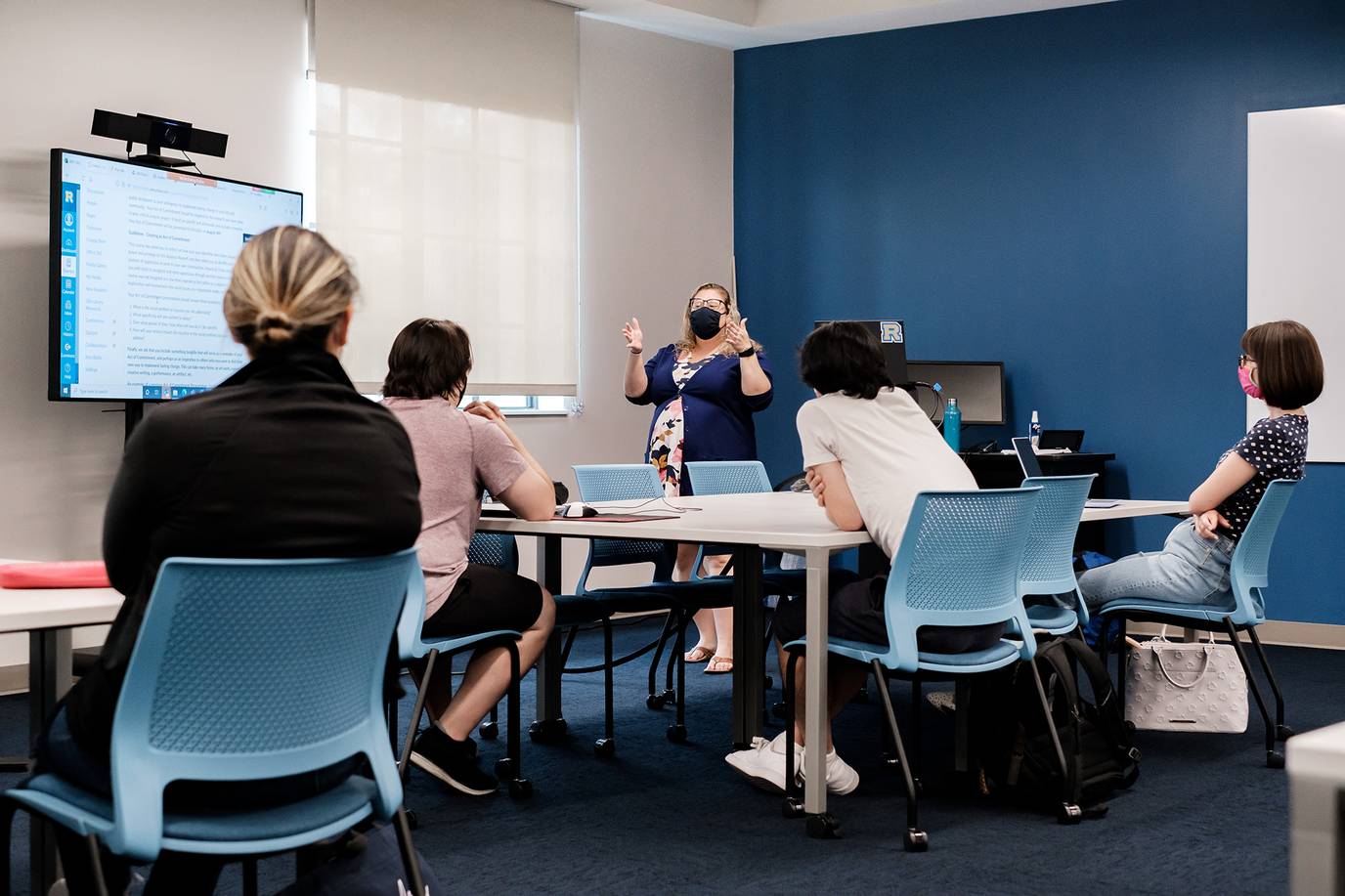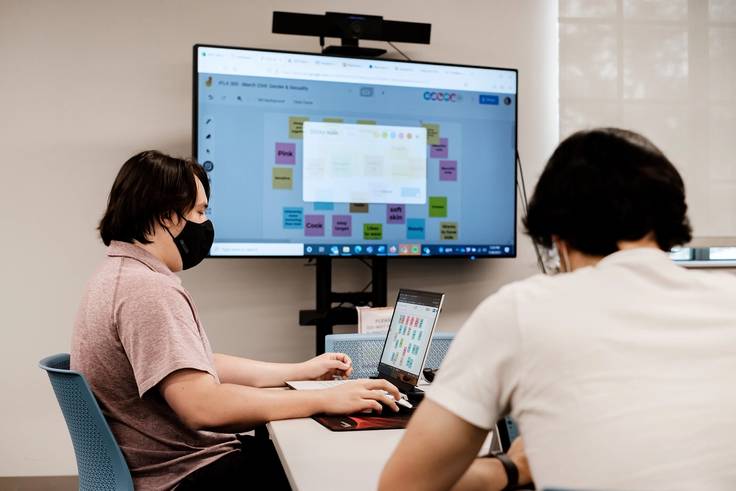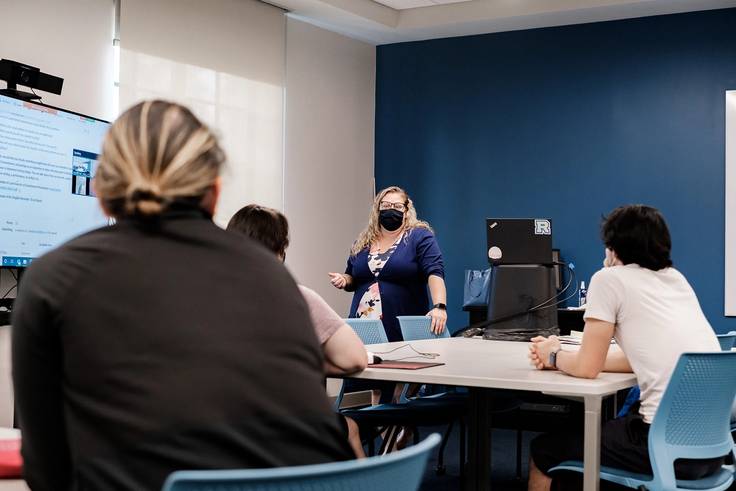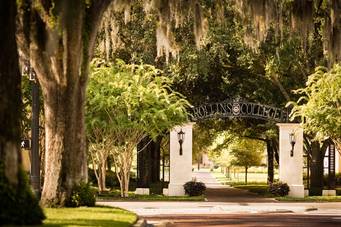Course Spotlight: Introduction to Liberal Studies
August 20, 2021
By Elsa Wenzel

This Hamilton Holt School class both introduces students to the liberal arts at Rollins and challenges them to put classroom theories into practice in impactful, enduring ways.
In Defense of a Liberal Education by Fareed Zakaria. Arnold Lobel’s Frog and Toad series. The Leadership Challenge by James Kouzes and Barry Posner. These seminal works inspire self-reflection on education, personal change, and leadership and serve as the hallmark texts of Introduction to Liberal Studies, a foundational course in Rollins’ Hamilton Holt School that address rotating themes like social justice, the American Renaissance, and leadership in business.
But these texts and concepts don’t mean only turning inward. Through this course, you’ll develop a mindset of growth and grit, doing hands-on work with community partners, meeting inspirational leaders, and tapping into Rollins’ extensive and personalized career planning services. It’s a course that directly supports the promise of a Rollins education: creating global citizens and responsible leaders who are prepared to live meaningful lives and forge productive careers.
“It’s about what it means not only to explore the depth of a particular discipline, but also the breadth of how all of the wonderful programs on campus prepare you for taking a broader snapshot of the world,” says Meredith Hein, director of Rollins’ Center of Leadership & Community Engagement who teaches the Advocating for Change section of the course. “It really helps you understand your discipline or major on a larger level because you’re looking at it from so many different perspectives.”
Instructors
- Meredith Hein, director of Center for Leadership & Community Engagement
- Edythe McNickle, professor of business administration
- Patricia Simmons, professor of humanities
- Bruce Stephenson, professor of environmental studies

The Scoop
Introduction to the Liberal Arts is more of a program than a single course, with distinct sections offered depending on the semester on topics as varied as advocacy for social change, understanding philosophy for children, and defining leadership. What these have in common is immersing students in how a liberal arts education dovetails with the Rollins mission while engaging them with community partners and resources on campus.
By listening to the needs of the community, Holt School students—many of whom are already in the workforce in fields like education, business, human resources, and real estate—come to think intentionally about how to engage in a profession that is doing good for others and creating innovative solutions to the world’s greatest challenges.
“They’re thinking about the people that they work for, or worked with, but they may not be necessarily thinking about their own leadership,” says business professor Edythe McNickle, who teaches the Leading the Way section of the Introduction to Liberal Studies course. “It’s understanding that leadership is not the CEO; leadership is a role that we all have capacity for within us and that we need to figure out how best to use it to benefit and develop other people.”
In developing a personal leadership statement that serves as a roadmap for their future, McNickle’s students apply the framework of Kouzes’ and Posner’s theory of effective leadership, one that squares directly with Rollins’ brand of liberal arts education: “Model the way, inspire a shared vision, challenge the process, enable others to act, and encourage the heart.”
Students further fine-tune that vision by working on projects for New Hope for Kids, a local nonprofit grief center for children and families, and by interacting with and learning from a variety of community leaders, including CEOs, nonprofit leaders, judges, academic deans, and medical doctors.

Snapshot
In Hein’s course this past semester, Advocating for Change, students explored provocative texts, such as the signature work of social activist author Bell Hooks, Understanding Patriarchy, and jumped right into exploring local community issues like housing and food insecurity at nearby College Park Middle School.
“Some of the things that students identified for consecutive semesters was that teachers, specifically at Title I schools, were exhausted and not feeling valued,” says Hein.
In response, her students created teacher gratitude bags as well as a series of “time-out” videos that taught middle schoolers about nutrition, gardening, and hygiene. Hein’s students also worked with Sodexo, the College’s food-service provider, to make free lunches available to the children.
“We’re exposing students right off the bat to who we are as an institution,” says Hein. “At Rollins, it’s a top priority for us to engage with our local communities, listen to their needs, and work alongside them.”

Student Perspectives
“This course showed me all the resources we have at Rollins for personal development, career advice, and finding jobs,” says Caitlin Jackson ’22, a psychology major who helped local grief center New Hope for Kids brainstorm ideas for virtual summer camps. “It really opened my eyes to the charities in the community I wouldn’t have been aware of otherwise. It gave me a better idea of what’s involved and what’s out there.”
Tracey Comazzi ’22, a major in environmental studies and sustainable urbanism, appreciated the course for outlining how Rollins’ signature educational approach empowers you to create your own distinctive path and apply your passions in different ways. During this class, she made a video demonstrating how to plant pollinator herbs for teachers at College Park Middle School.
“I found this course really valuable,” says Comazzi. “It makes you feel good when you help; you feel like you have a sense of purpose.”
Did You Know?
This interdisciplinary course was developed to give students of the Hamilton Holt School—named after the College’s eighth president—a foundational anchor among their first six courses. It’s similar to the Rollins College Conference (RCC) course in the College of Liberal Arts, which has its roots in the conference model developed by Hamilton Holt himself.

Take a Closer Look
From virtual and on-campus information sessions to one-on-one meetings with an admission counselor, Rollins’ Professional Advancement program offers an array of ways to learn about our flexible and affordable degrees, seamless transfer experience, guaranteed admission policy, and more.
Read More
May 22, 2024
Earth Charter International Conference Held at Rollins
In April, Rollins played host to the fifth annual Earth Charter Conference, a three-day event focused on education for sustainability and global citizenship and for planetary well-being.
March 18, 2024
The Meaning of a Good Life
After attending seven colleges across three decades, Eric Reichwein ’18 discovered Rollins’ Professional Advancement programs and the quality of life he’d always wanted.
March 14, 2024
How I Advanced My Career: Eric Reichwein ’18
Find out how Eric Reichwein ’18 leveraged the personalized learning environment and top-ranked reputation of Rollins’ Professional Advancement programs to finish his bachelor’s degree and build the life and career he’s always dreamed of.
